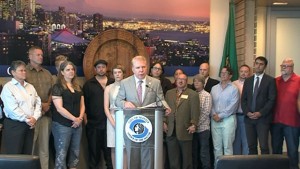While we continue to celebrate the recent hard-earned Supreme Court victory on marriage equality, we are also be alarmed by the recent surge in violence against our community—mainly targeted at transgender women of color and young people experiencing homelessness.
Fourteen* transgender women of color have been murdered since the beginning of the year.
Take a moment to let that number truly sink in. Not only is it a conservative estimate (given the lack of reporting and the tendency for victims to be misgendered), it also surpasses the number of transgender women of color reportedly murdered in the entirety of 2014.
And it’s only August.
The increase in bias and hate crimes against our community represents a real and tragic loss of life that can’t be ignored. And it’s a serious threat to the health and well-being of our vibrant region.
According to a report from the National Coalition of Anti-Violence Programs (NCAVP), in 2014—for the fourth year in a row—transgender people, LGBTQ and HIV-affected people, and particularly transgender people of color, experienced disproportionately severe violence. More than half of the homicide victims in 2014 were transgender women, and 50 percent of the victims were transgender women of color.
Even in a city like Seattle that has relatively robust and comprehensive legal protections, we are not immune to this. The Capitol Hill neighborhood—long known as a bastion for our community, with a rich, deep LGBTQ history—is changing in front of our eyes. As more people move to the city, a neighborhood that used to be welcoming and accepting is now becoming a place where many feel unsafe to walk home alone at night.
In order to address a rise in reported bias crimes and attacks against LGBTQ people, Seattle Mayor Ed Murray assembled a Hate Crimes Task Force in March. I was honored to be asked to join the Task Force on behalf of Pride Foundation.
The Task Force came up with a detailed action plan and set of recommendations to help make the city safer and more welcoming for our community. The solutions outlined in the plan acknowledge that we need a coordinated and comprehensive approach, including public safety, increased support for youth, changes to our built environment, and increased public understanding.
I want to highlight two recommendations that specifically speak to the critical intersection of our work (the full report can be found here).
- Support efforts to improve social service agencies in their work to support LGBTQ homeless youth, such as Project EQTY. The Mayor will be requesting an allocation of the 2016 budget to support Project EQTY (led by the Northwest Network of Bisexual, Trans, Lesbian, and Gay Survivors of Abuse), a three-year capacity building project focused on improving service providers ability to meet the unique needs of homeless LGBTQ youth. Pride Foundation is currently the sole funder of Project EQTY through our Homeless Youth Initiative. This additional funding will go a long way in expanding the scope and capacity of the project. Ensuring that LGBTQ youth are supported through our child welfare system is a huge step toward reducing homelessness and ensuring the safety of all youth.
- Support community-based responses to violence and intolerance. In order to increase the safety and well-being of our community, it is critical that those who report violence or seek assistance are able to receive support from a trusted source. While increasing the capacity of the police department is an important component of this work, we also know that many in our community have faced trauma at the hands of the police. By simultaneously investing in community-based responses, we’re acknowledging that LGBTQ organizations and those most impacted have an important and meaningful role to play in determining solutions.
Since the Task Force released its recommendations, we’ve already had an important victory that acknowledges the heightened risk of violence faced by transgender people. Last Monday, Seattle City Council passed legislation requiring that single-occupant restrooms in City-operated facilities and private places of public accommodations be designated as “all-gender.”
I’m the first to admit that these recommendations aren’t the end point for our work in this area. It is going to take everyone coming together—community groups, faith leaders, businesses, and government agencies—to create systemic change that supports our entire community. Yet this was a critical and important first step.
This is an issue that impacts all of us—not just in Seattle, but across our entire country. This is also an issue that won’t go away as a result of the incredible advances we’ve made to win formal legal equality.
It’s time to acknowledge what this is: an urgent crisis facing our community. Moving forward, it will be essential to double our efforts to raise awareness and engage the public. Our lives are at stake.
We look forward to working with partners across the Northwest to ensure that we build communities that honor and respect our shared humanity—allowing every one of us to be welcomed and safe.
Kris Hermanns is Pride Foundation’s Executive Director. Email Kris.
*This statistic came from a recent news article. Given the sad reality that this number continues to increase, it’s possible this is not a full representation of all the transgender women of color that have been murdered in the past year.
